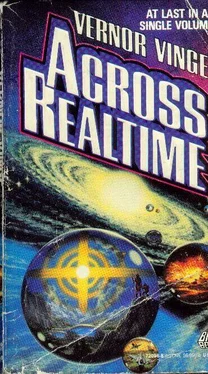Vernor Vinge - Across Realtime
Здесь есть возможность читать онлайн «Vernor Vinge - Across Realtime» весь текст электронной книги совершенно бесплатно (целиком полную версию без сокращений). В некоторых случаях можно слушать аудио, скачать через торрент в формате fb2 и присутствует краткое содержание. Жанр: Фантастика и фэнтези, на английском языке. Описание произведения, (предисловие) а так же отзывы посетителей доступны на портале библиотеки ЛибКат.
- Название:Across Realtime
- Автор:
- Жанр:
- Год:неизвестен
- ISBN:нет данных
- Рейтинг книги:4 / 5. Голосов: 1
-
Избранное:Добавить в избранное
- Отзывы:
-
Ваша оценка:
- 80
- 1
- 2
- 3
- 4
- 5
Across Realtime: краткое содержание, описание и аннотация
Предлагаем к чтению аннотацию, описание, краткое содержание или предисловие (зависит от того, что написал сам автор книги «Across Realtime»). Если вы не нашли необходимую информацию о книге — напишите в комментариях, мы постараемся отыскать её.
Across Realtime — читать онлайн бесплатно полную книгу (весь текст) целиком
Ниже представлен текст книги, разбитый по страницам. Система сохранения места последней прочитанной страницы, позволяет с удобством читать онлайн бесплатно книгу «Across Realtime», без необходимости каждый раз заново искать на чём Вы остановились. Поставьте закладку, и сможете в любой момент перейти на страницу, на которой закончили чтение.
Интервал:
Закладка:
Allison Parker's world ended with that thought.
ONE
The Old California Shopping Center was the Santa Ynez Police Company's biggest account - and one of Miguel Rosas' most enjoyable beats. On this beautiful Sunday afternoon, the Center had hundreds of customers, people who had traveled many kilometers along Old 101 to be here. This Sunday was especially busy: All during the week, produce and quality reports had shown that the stores would have best buys. And it wouldn't rain till late. Mike wandered up and down the malls, stopping every now and then to talk or go into a shop and have a closer look at the merchandise. Most people knew how effective the shoplift-detection gear was, and so far he hadn't had any business whatsoever.
Which was okay with Mike. Rosas had been officially employed by the Santa Ynez Police Company for three years. And before that, all the way back to when he and his sisters had arrived in California, he had been associated with the company. Sheriff Wentz had more or less adopted him, and so he had grown up with police work, and was doing the job of a paid undersheriff by the time he was thirteen. Wentz had encouraged him to look at technical jobs, but somehow police work was always the most attractive. The SYP Company was a popular outfit that did business with most of the families around Vandenberg. The pay was good, the area was peaceful, and Mike had the feeling that he was really doing something to help people.
Mike left the shopping area and climbed the grassy hill that management kept nicely shorn and cleaned. From the top he could look across the Center to see all the shops and the brilliantly dyed fabrics that shaded the arcades.
He tweaked up his caller in case they wanted him to come down for some traffic control. Horses and wagons were not permitted beyond the outer parking area. Normally this was a convenience, but there were so many customers this afternoon that the owners might want to relax the rules.
Near the top of the hill, basking in the double sunlight, Paul Naismith sat in front of his chessboard. Every few months, Paul came down to the coast, sometimes to Santa Ynez, sometimes to towns further north. Naismith and Bill Morales would come in early enough to get a good parking spot, Paul would set up his chessboard, and Bill would go off to shop for him. Come evening, the Tinkers would trot out their specialties and he might do some trading. For now the old man slouched behind his chessboard and munched his lunch.
Mike approached the other diffidently. Naismith was not personally forbidding. He was easy to talk to, in fact. But Mike knew him better than most- and knew the old man's cordiality was a mask for things as strange and deep as his public reputation implied.
"Game, Mike?" Naismith asked.
"Sorry, Mr. Naismith, I'm on duty. "Besides, I know you never lose except on purpose.
The older man waved impatiently. He glanced over
Mike's shoulder at something among the shops, then lur-ched to his feet. "Ah. I'm not going to snare anyone this afternoon. Might as well go down and window shop."
Mike recognized the idiom, though there were no "win-dows" in the shopping center, unless you counted the glass covers on the jewelry and electronics displays. Naismith's generation was still a majority, so even the most archaic slang remained in use. Mike picked up some litter but couldn't find the miscreants responsible. He stowed the trash and caught up with Naismith on the way down to the shops.
The food vendors were doing well, as predicted. Their tables were overflowing with bananas and cacao and other local produce, as well as things from farther away, such as ap-ples. On the right, the game area was still the province of the kids. That would change when evening came. The curtains and canopies were bright and billowing in the light breeze, but it wasn't till dark that the internal illumination of the dis-plays would glow and dance their magic. For now, all was muted, many of the games powered down. Even chess and the other symbiotic games were doing a slow business. It was almost a matter of custom to wait till the evening for the buying and selling of such frivolous equipment.
The only crowd, five or six youngsters, stood around Gerry Tellman's Celest game. What was going on here? A lit-tle black kid was playing - had been playing for fifteen minutes, Mike realized. Tellman had Celest running at a high level of realism, and he was not a generous man. Hmmm.
Ahead of him, Naismith creaked toward the game. Ap-parently his curiosity was pricked, too.
Inside the shop it was shady and cool. Tellman perched on a scuffed wood table and glared at his small customer. The boy looked to be ten or eleven and was clearly an outlander: His hair was bushy, his clothes filthy. His arms were so thin that he must be a victim of disease or poor diet. He was chew-ing on something that Mike suspected was tobacco -definitely not the sort of behavior you'd see in a local boy.
The kid clutched a wad of Bank of Santa Ynez gAu notes. From the look on Tellman's face, Rosas could guess where they came from.
"Otra vez," the boy said, returning Tellman's glare. The proprietor hesitated, looked around the circle of faces and noticed the adults.
"Aw right," agreed Tellman, "but this'll have to be the last time... Esta es el final, entiende?" he repeated in pidgin Spanish. "I, uh, I gotta go to lunch." This remark was probably for the benefit of Naismith and Rosas.
The kid shrugged. "Okay."
Tellman initialized the Celest board to level nine, Rosas noticed. The kid studied the setup with a calculating look. Tellman's display was a flat, showing a hypothetical solar system as seen from above the plane of rotation. The three planets were small disks of light moving around the primary. Their size gave a clue to mass, but the precise values appeared near the bottom of the display. Departure and arrival planets moved in visibly eccentric orbits, the departure planet at one rev every five seconds - fast enough so precession was clearly occurring. Between it and the destination planet moved a third world, also in an eccentric orbit. Rosas grimaced. No doubt the only reason Tellman left the problem coplanar was that he didn't have a holo display for his Celest. Mike had never seen anyone without a symbiotic processor play the departure/destination version of Celest at level nine. The timer on the display showed that the player - the kid - had ten seconds to launch his rocket and try to make it to the destination. From the fuel display, Rosas was certain that there was not enough energy available to make the flight in a direct orbit. A cushion shot on top of every-thing else!
The kid laid all his bank notes on the table and squinted at the screen. Six seconds left. He grasped the control handles and twitched them. The tiny golden spark that represented his spacecraft fell away from the green disk of the departure world, inward toward the yellow sun about which all revolved. He had used more than nine-tenths of his fuel and had boosted in the wrong direction. The children around him murmured their displeasure, and a smirk came over Tellman's face. The smirk froze:
As the spacecraft came near the sun, the kid gave the con-trols another twitch, a boost which - together with the gravity of the primary-sent the glowing dot far out into the mock solar system. It edged across the two-meter screen, slowing at the greater remove, heading not for the destina-tion planet but for the intermediary. Rosas gave an low, involuntary whistle. He had played Celest, both alone and with a processor. The game was nearly a century old and al-most as popular as chess; it made you remember what the human race had almost attained. Yet he had never seen such a two-cushion shot by an unaided player.
Tellman's smile remained but his face was turning a bit gray. The vehicle drew close to the middle planet, catching up to it as it swung slowly about the primary. The kid made barely per-ceptible adjustments in the trajectory during the closing period. Fuel status on the display showed 0.001 full. The repre-sentation of the planet and the spacecraft merged for an instant, but did not record as a collision, for the tiny dot moved quickly away, going for the far reaches ofthe screen.
Читать дальшеИнтервал:
Закладка:
Похожие книги на «Across Realtime»
Представляем Вашему вниманию похожие книги на «Across Realtime» списком для выбора. Мы отобрали схожую по названию и смыслу литературу в надежде предоставить читателям больше вариантов отыскать новые, интересные, ещё непрочитанные произведения.
Обсуждение, отзывы о книге «Across Realtime» и просто собственные мнения читателей. Оставьте ваши комментарии, напишите, что Вы думаете о произведении, его смысле или главных героях. Укажите что конкретно понравилось, а что нет, и почему Вы так считаете.








